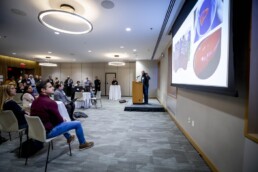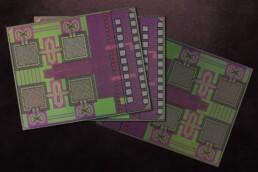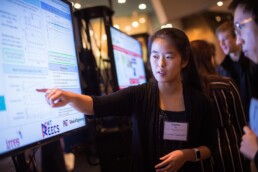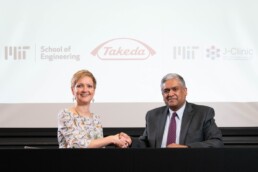MIT-Takeda program launches
Research projects will harness the power of artificial intelligence to positively impact human health.
In February, researchers from MIT and Takeda Pharmaceuticals joined together to celebrate the official launch of the MIT-Takeda Program. The MIT-Takeda Program aims to fuel the development and application of artificial intelligence (AI) capabilities to benefit human health and drug development. Centered within the Abdul Latif Jameel Clinic for Machine Learning in Health (Jameel Clinic), the program brings together the MIT School of Engineering and Takeda Pharmaceuticals, to combine knowledge and address challenges of mutual interest.
Following a competitive proposal process, nine inaugural research projects were selected. The program’s flagship research projects include principal investigators from departments and labs spanning the School of Engineering and the Institute. Research includes diagnosis of diseases, prediction of treatment response, development of novel biomarkers, process control and improvement, drug discovery, and clinical trial optimization.
“We were truly impressed by the creativity and breadth of the proposals we received,” says Anantha P. Chandrakasan, dean of the School of Engineering, Vannevar Bush Professor of Electrical Engineering and Computer Science, and co-chair of the MIT-Takeda Program Steering Committee.
Cryptographic “tag of everything” could protect the supply chain
Tiny, battery-free ID chip can authenticate nearly any product to help combat losses to counterfeiting.
To combat supply chain counterfeiting, which can cost companies billions of dollars annually, MIT researchers have invented a cryptographic ID tag that’s small enough to fit on virtually any product and verify its authenticity.
A 2018 report from the Organization for Economic Co-operation and Development estimates about $2 trillion worth of counterfeit goods will be sold worldwide in 2020. That’s bad news for consumers and companies that order parts from different sources worldwide to build products.
Counterfeiters tend to use complex routes that include many checkpoints, making it challenging to verifying their origins and authenticity. Consequently, companies can end up with imitation parts. Wireless ID tags are becoming increasingly popular for authenticating assets as they change hands at each checkpoint. But these tags come with various size, cost, energy, and security tradeoffs that limit their potential.
At halfway point, SuperUROP scholars share their research results
In a lively poster session, more than 100 undergraduates discuss their yearlong research projects on everything from machine learning to political geography.
MIT undergraduates are rolling up their sleeves to address major problems in the world, conducting research on topics ranging from nursing care to money laundering to the spread of misinformation about climate change — work highlighted at the most recent SuperUROP Showcase.
The event, which took place on the Charles M. Vest Student Street in the Stata Center in December 2019, marked the halfway point in the Advanced Undergraduate Research Opportunities Program (better known as “SuperUROP”). The yearlong program gives MIT students firsthand experience in conducting research with close faculty mentorship. Many participants receive scholar titles recognizing the program’s industry sponsors, individual donors, and other contributors.
This year, 102 students participated in SuperUROP, with many of their projects focused on applying computer science technologies, such as machine learning, to challenges in fields ranging from robotics to health care. Almost all presented posters of their work at the December showcase, explaining research to fellow students, faculty members, alumni, sponsors, and other guests.
MIT School of Engineering and Takeda join to advance research in artificial intelligence and health
A key part of J-Clinic, the MIT-Takeda Program will create educational opportunities and support cutting-edge research to positively impact human health.
MIT’s School of Engineering and Takeda Pharmaceuticals Company Limited today announced the MIT-Takeda Program to fuel the development and application of artificial intelligence (AI) capabilities to benefit human health and drug development. Centered within the Abdul Latif Jameel Clinic for Machine Learning in Health (J-Clinic), the new program will leverage the combined expertise of both organizations, and is supported by Takeda’s three-year investment (with the potential for a two-year extension).
This new collaboration will provide MIT with extraordinary access to pharmaceutical infrastructure and expertise, and will help to focus work on challenges with lasting, practical impact. A new educational program offered through J-Clinic will provide Takeda with the ability to learn from and engage with some of MIT's sharpest and most curious minds, and offer insight into the advances that will help shape the health care industry of tomorrow.
“We are thrilled to create this collaboration with Takeda,” says Anantha Chandrakasan, dean of MIT’s School of Engineering. “The MIT-Takeda Program will build a community dedicated to the next generation of AI and system-level breakthroughs that aim to advance healthcare around the globe.”



